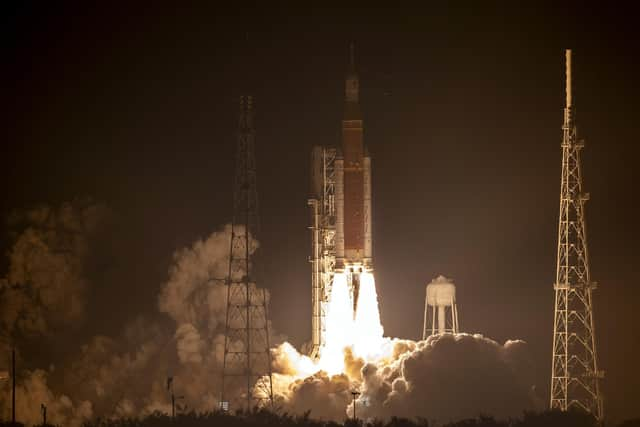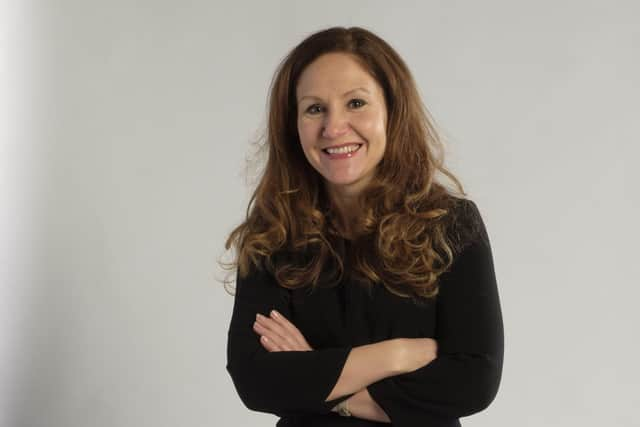The sky’s the limit for Graduate Apprenticeships - Prof Gillian Murray
Indeed, these are exciting times for the international space sector. In Britain, momentum has built over the last decade and, increasingly, Scotland is finding itself at the forefront of many of the UK’s biggest industry developments.
Most recently in December 2022, Dr Hina Khan, a former NASA research associate, became the first-ever executive director of Space Scotland (SSLC). Dr Khan’s appointment is a critical collective step towards achieving Scotland’s ambition of amassing a wealth of talent, R&D expertise and launch services.
Advertisement
Hide AdAdvertisement
Hide AdSince 2016, space businesses have increased by more than 65 per cent in Scotland. By 2030, it is expected that the national sector workforce will increase fivefold. Contributing to this figure will be the recently announced £83.7m-space engineering hub in Prestwick which is set to foster several hundred jobs once complete.


For this trajectory to be maintained, and Scotland cement itself at the heart of the UK space sector proposition, there needs to be an impetus on skills development across key supporting industries and business sectors. Increasingly, universities are playing a key role in delivering the skills needed to meet the growing and evolving demands of Scotland’s space sector by working directly in partnership with organisations and businesses.
In particular, Graduate Apprenticeships are helping to unlock further education opportunities that create degree-qualified employees who have key skills tailored to the needs of individual industry-focused businesses.
Graduate Apprenticeships allow learners at any stage of their careers to study for a degree-level qualification while working for a company. They combine the best of both worlds – apprentices can gain academic knowledge whilst at the same time developing real-world on-the-job experience, giving them the skills needed to help solidify Scotland’s space sector and grow our economy.
The programme is also a pivotal tool in helping break traditional perceptions and barriers to career paths. For instance, since launching in 2017, the proportion of female Graduate Apprentices studying STEM subjects has grown from 18.1 per cent to 21.2 per cent. During that same period, the proportion of women registering for a Graduate Apprenticeship has almost doubled, with women now accounting for more than one third of new recruits.


Partnerships have already been established with a range of forward-thinking space-sector businesses including Celestia UK, an international space satellite systems manufacturer which has set up production facilities in Edinburgh.
Speaking recently of the programme, Celestia UK’s CEO Malachy Devlin said: “The Graduate Apprenticeship scheme allows us to bring in graduates at an early stage in their studies and get them involved in various areas of the organisation. The programme really benefits students' understanding of how the skills they’re learning are applied in a real-world setting – helping them on their way to becoming job-ready graduates.”
Companies like Celestia UK are playing a significant role not just as the forefront of space exploration but back here on Earth, establishing Scotland’s growing reputation amongst its international peers.
Advertisement
Hide AdAdvertisement
Hide AdIn 2020, Celestia UK ‘spun in’ to the Global Research Innovation and Discovery (GRID) facility at Heriot-Watt University as part of a strategic plan to establish a base in the UK. This allowed the organisation to launch its next development phase, including setting up new lab and assembly facilities and establishing a larger base to deliver cutting-edge innovation in satellite-on-the-move user terminals and gateway systems. University support helped establish the business in Edinburgh and strengthen its links with local businesses.
By the end of the decade, Nasa intends to get mankind back on the Moon via its Gateway space station. As we look to the future, an education ecosystem that works in partnership with employers could help take us to the stars.
Professor Gillian Murray, deputy principal for business and enterprise at Heriot-Watt University
Comments
Want to join the conversation? Please or to comment on this article.